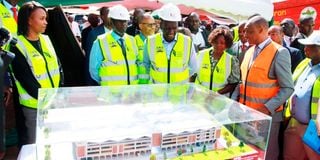State sets aside Sh13bn for new markets, revival of stalled ones in counties

President William Ruto looks at a market model as he launched the construction of Embu Modern Market in Embu County on May 26, 2023.
The national government has partnered with counties to implement a multi-billion programme to set up hundreds of modern markets.
President William Ruto has announced that his administration has allocated Sh13 billion for the programme in the 2023-2024 budget and engaged governors in benefiting counties on the framework for the joint venture.
Some 39 metropolitan markets will be constructed in metropolitan counties at Sh400 million each and county markets at Sh150 million each, with the national and county governments cost-sharing.
In addition, 100 municipal markets will be built under the Kenya Urban Support Programme Phase II at Sh50 million each, with counties tasked to ensure that each market is prioritised in procurement plans. Some 181 fresh produce markets that stalled after being commissioned during President Mwai Kibaki’s time will also be revived.
According to Housing and Urban Development Principal Secretary Charles Hinga, the national government will work with counties to identify locations for the metropolitan markets, prepare project plans, procure materials and manage projects.
Metropolitan markets
“A memorandum of understanding (MoU) on sharing revenue generated from this programmes will be signed between the two levels of government. We recommend that 60 per cent be reinvested into the markets for maintenance, upgrading, and expansion,” Mr Hinga said of the metropolitan markets.
Kiambu County is expected to benefit from Sh3 billion projects that will see the Governor Kimani Wamatangi-led administration work with the national government to erect five markets at Sh400 million each and 20 prototype markets at Sh50 million each.
Madaraka market in Thika, Githunguri, Wangige in Kabete, Kangangi marke and Ruiru Phase 2 in Githurai are among the markets in the programme, according to Mr Wamatangi.
“Immediately after I took office last year, I secured an appointment with the President, and among the pleas that I had were markets, and he agreed to support the county with five mega ones. I also had a list of 10 mini-markets, but out of his generosity, he doubled the number. My administration is also completing stalled market projects and building new ones in various areas,” Mr Wamatangi said.
According to the governor, the county has allocated hundreds of millions of shillings to augment the national government’s contribution to ensure the facilities are cutting-edge and have characteristics that will make them attractive to traders and customers.
During his recent visit to the county, President Ruto stated that his ministry and the county government had agreed to implement the projects.
Mini-markets
“We met with the Kiambu governor and agreed on what the county is expected to do to achieve this. We also agreed on other mini-markets in trading centres where the county government was to secure land. Governor Wamatangi confirmed that he had set aside land for 20 markets at Sh1 billion. We have already developed the designs,” President Ruto said.
As part of the market implementation process, Mr Hinga has spoken to counties through letters to Council of Governor Chairperson Anne Waiguru and Chief Executive Mary Mwiti.
In a letter seen by the Nation, Lands Minister Zachary Njeru wrote to 45 county secretaries informing them that this month, a technical team from the ministry would inspect the stalled markets as part of the revival plans. To assist the ministry in the process, counties were asked to select at least two technical officers, a clerk of works, a physical planner/land surveyor and an architect to join the team.
The market projects have, however, triggered friction between counties and a section of MPs. Thika Town’s Alice Ng’ang’a, for instance, sought to take credit for the projects. Speaking at the market during an inspection tour by officers from the ministry and the county last week, Ms Ng’ang’a took issue with the devolved unit’s administration for seeking to duplicate a function the national government should handle.
“I want to state here categorically that this market is being built by the national government; they have given us Sh400 million. The county government of Kiambu should keep off and do other markets with the money they claim to have,” said Ms Ng’ang’a.
However, under Schedule Four of the Constitution, which lists the duties of counties, trade development and regulation are the responsibility of the counties, including the creation of markets. The devolved units are free to engage in collaborations, issue trade licenses (apart from the regulation of professions), fair trading practices, local tourism, and cooperative societies.
In contrast, MPs, who have the responsibility of oversight, representation and lawmaking, deal with the Constituency Development Fund, which is responsible for the construction of classrooms in primary and secondary schools, police posts and bursaries.





